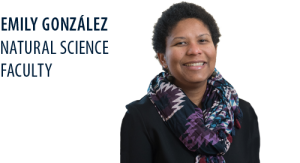She’s a Natural at Teaching Natural Sciences
 By the time Professor Emily González has finished applying cell structure to students’ lives, they are as interested in natural science as she is.
By the time Professor Emily González has finished applying cell structure to students’ lives, they are as interested in natural science as she is.
González knows how to take heady subjects and make them relatable.
For example, defects in a cell’s structure can cause diseases like diabetes, cystic fibrosis and high blood cholesterol. This gets the students’ attention, she says, because invariably someone in the class knows someone with a disease and leads to spirited discussions.
“I’m excited to impart to my students concepts that are interesting and are applicable to their lives and careers,” she says. “I am excited when my students make the connections between concepts and their eyes light up in a Eureka moment.”
The Jamaican native has been teaching physiological chemistry, anatomy and physiology, human health and nutrition, and human biology at Northern Essex for the last 13 years. She has also been instrumental in developing a new clinical research coordinator certificate program to fill an industry void.
“As we continue to move toward a knowledge-based economy we will need an increasingly larger number of scientifically trained work force to remain economically competitive,” she says.
And what better place to train for scientifically-focused jobs than at Northern Essex. To support this sentiment, González cites data from the National Science Foundation’s National Center for Science and Engineering Statistics which shows that 49* of those who received a bachelor’s degree in science and engineering completed some of the their courses at a community college.
González herself attended Barbados Community College where she earned an associate of science degree in natural science. She went on to attend UMass-Lowell where she received a bachelor of science in biological science and to UMass-Amherst where she received a master of science in microbiology with a focus on plant pathology.
González said she was drawn to science out of sheer curiosity and a father who encouraged a love of scientific study.
“I like to know the underlying reasons why organisms work the way they do and one must have a sound foundation in physics and chemistry as well as biological concepts,” she said.
On a regular basis González says continues to be wowed by science.
“The understanding of cell structure and metabolism continues to evolve with the help of new technologies,” she said. “The applications of natural science is so vast and varied it leaves one in awe of its potential use.”
Each student, she says, is different in terms of what excites them about a subject. By applying it to their field of study or everyday life is the key to engaging them.







